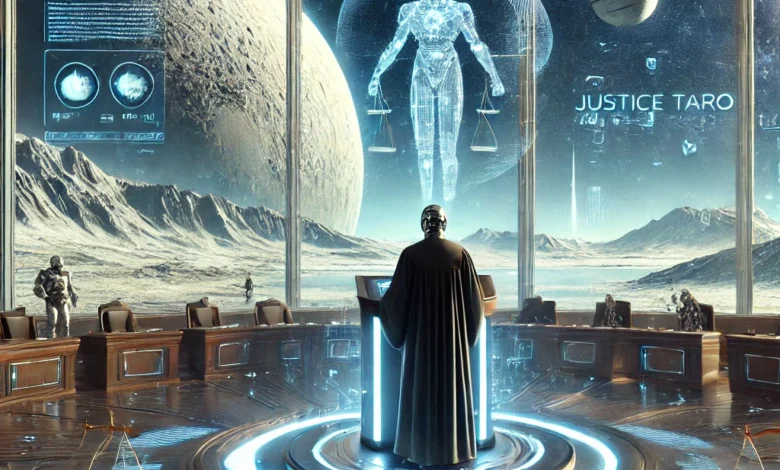Justice Taro in Pluto: A Vision of Law Beyond Earth

The idea of Justice Taro in Pluto evokes an intriguing blend of law, philosophy, and space exploration. Whether envisioned as a futuristic legal system, a legendary figure, or a sci-fi narrative, Justice Taro symbolizes humanity’s need for order, even in the farthest reaches of our solar system. As we move closer to space colonization, the question of how justice will be upheld in extraterrestrial environments becomes increasingly relevant. Pluto, as one of the most remote celestial bodies, serves as the perfect backdrop for exploring the evolution of law in space.
Who is Justice Taro?
Justice Taro could be many things: a human judge, an AI-driven arbiter, or a mythological figure representing fairness in the universe. If imagined as a character, Taro might be the chief judge of Pluto’s first human settlement, overseeing disputes in a world where resources are scarce, survival is uncertain, and moral dilemmas are ever-present.
Alternatively, Justice Taro might be the name of a legal framework—an advanced algorithm programmed to administer justice based on logic, ethics, and necessity. In a future where humans establish permanent bases on Pluto, governance will be a critical issue. Who enforces the law in a place where Earth’s jurisdiction is millions of miles away? Can AI-driven justice replace human judgment in such extreme conditions?
Justice Taro could also be the title of a fictional series where Pluto serves as the setting for high-stakes legal drama. Imagine a law enforcer navigating the icy terrain of Pluto, balancing the harshness of survival with the ideals of justice.
The Challenges of Law on Pluto
Pluto is an unforgiving world, with temperatures averaging -229°C (-380°F), gravity only 6% that of Earth’s, and a thin atmosphere composed mainly of nitrogen. In such an environment, enforcing laws poses unique challenges that differ significantly from those on Earth.
Jurisdictional Complexity
One of the biggest questions about law in space is jurisdiction. Should Pluto be governed by Earth’s laws, or should settlers develop their own legal system? If Justice Taro represents a governing authority, would they act under the United Nations Outer Space Treaty, or would Pluto become an independent legal entity?
Currently, international space law dictates that celestial bodies cannot be claimed by any single nation, but this could change if Pluto becomes permanently inhabited. Justice Taro’s role could be to mediate between Earth’s laws and the necessity of self-governance in a distant colony.
Ethics vs. Survival
In the harsh conditions of Pluto, survival might take precedence over traditional ethical dilemmas. What happens when resources are so limited that not everyone can be saved? Would Justice Taro have to make life-or-death decisions based on logic rather than morality?
For example, if oxygen supplies are running low, should priority be given to those who contribute most to the colony’s survival? Would theft of vital resources be punishable by exile, knowing that exile in Pluto’s environment could mean certain death? Justice Taro’s decisions in such cases would shape the ethical foundation of Pluto’s society.
AI vs. Human Judgment
If Justice Taro is an artificial intelligence, how would it interpret human emotions, intent, and ethical dilemmas? AI may process facts and laws with precision, but can it truly understand the complexities of human nature?
For instance, if a colonist breaks a law out of desperation, would an AI judge be able to show compassion, or would it enforce punishment without regard for circumstances? If humans are in charge, would their personal biases and emotions lead to unjust rulings? The balance between AI and human judgment in legal systems is already a topic of debate on Earth, and in a place as isolated as Pluto, this debate becomes even more critical.
Justice Taro: A Symbol of Hope
Despite the challenges, Justice Taro in Pluto could symbolize hope, fairness, and the persistence of human values beyond Earth. Law and order are essential for any civilization, no matter how small or distant. Whether through an AI-driven legal system, a visionary human judge, or a legendary figure in space law, Justice Taro represents the idea that justice is not confined to Earth—it is a universal principle that follows humanity wherever it goes.
In fiction, Justice Taro could be the protagonist of a sci-fi courtroom drama set on Pluto, where they must balance loyalty to Earth’s legal system with the realities of survival in deep space. Imagine a gripping story where a rogue scientist is accused of sabotaging a life-support system, claiming it was necessary to expose a greater conspiracy. Justice Taro must determine whether the act was treason or heroism.
In reality, the concept of Justice Taro could inspire future legal discussions on how humanity will handle crime, disputes, and ethical dilemmas as we expand beyond our planet. Space law is still in its infancy, and as human settlements reach beyond Mars, we will need new legal structures to maintain order.
Read also: JonathonSpire: A Trusted Name in Digital Marketing
Conclusion
Justice Taro in Pluto is more than just a name—it’s a glimpse into the future of law in space. As we inch closer to interplanetary civilization, questions of governance, ethics, and fairness become crucial. Whether as a character in a story, an AI-driven legal system, or a symbol of extraterrestrial justice, Justice Taro embodies the timeless struggle between law and chaos, even in the coldest and most distant corners of our solar system.




